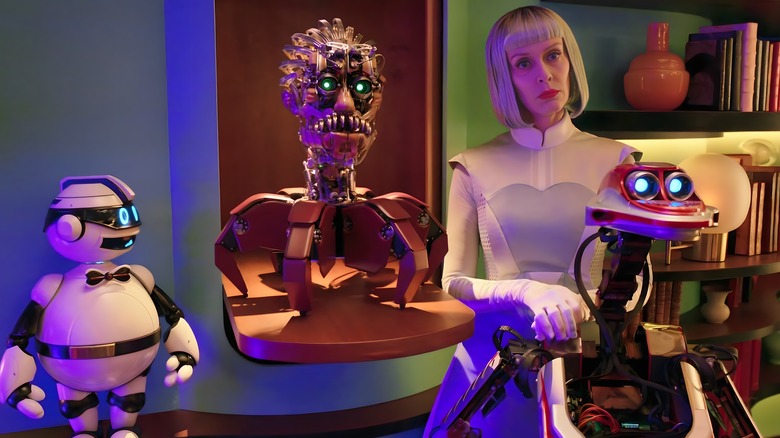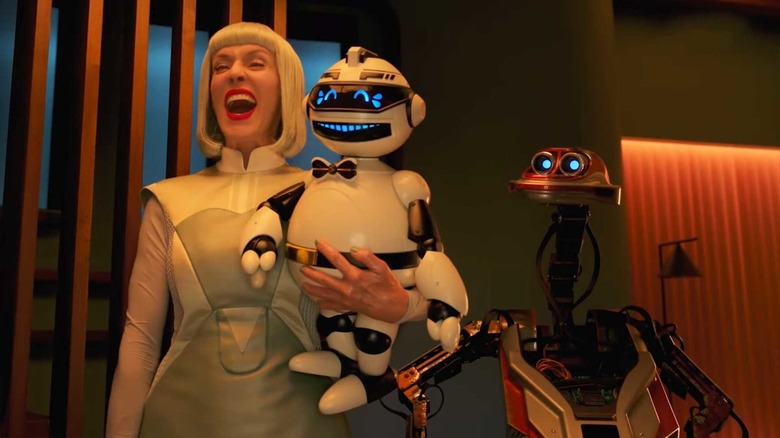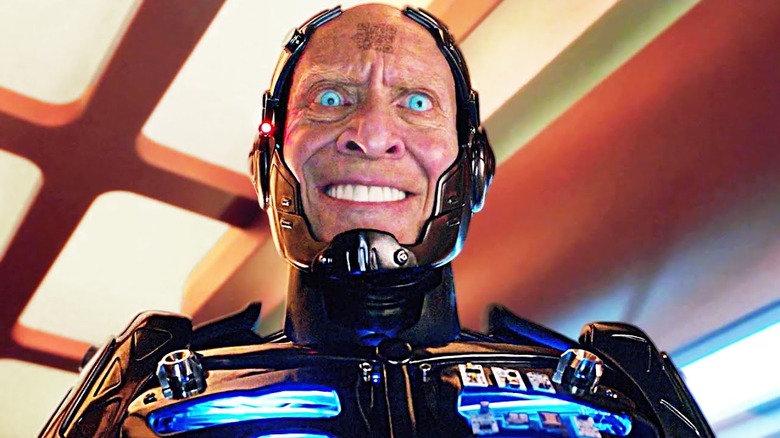BigBug On Netflix Is The Bizarre Smart Home Nightmare You've Never Heard Of
Filmmakers have been dabbling with the nightmarish possibilities of smart homes long before Amazon introduced the world to its Alexa virtual assistant, and they have spanned a variety of genres exploring these themes. Of course, examples like "Blade Runner" or "Iron Man" are the obvious first thoughts for most movie fans, but that ignores stellar titles like the 1977 sci-fi horror film "Demon Seed" about a supercomputer home system that tries to impregnate a woman to obtain a human form through a child or the LeVar Burton directed, family-friendly Disney Channel Original Movie "Smart House," starring Katey Sagal as a demented, techno-Donna Reed.
By and large, sci-fi films about smart homes becoming sentient or at least self-aware tend to be of the dystopian variety, serving as cautionary tales regarding human dependence on technology, or as a warning for us not to try and "play God" with computers.
But then there's a film like the borderline slapstick French feature "BigBug," a screwball sci-fi comedy that is currently making waves on Netflix charts across the globe. The film brought in a paltry 44 percent approval rating from critics at the time of its release, but boasts a much more positive 74 percent from audiences on Rotten Tomatoes. Even stranger is that the film comes from Jean-Pierre Jeunet and his frequent writing partner Guillaume Laurant ("The City of Lost Children," "Amelie," "A Very Long Engagement"), their first collaborative effort since 2013's "The Young and Prodigious T. S. Spivet."
Set in 2045, "BigBug" centers on four domestic robots who decide to hold their human masters hostage during a rogue android uprising. While that might sound terrifying on paper, "BigBug" is loaded with over-the-top, farcical comedy antics in addition to the bleak, existential questions posed by every AI-run-amok film ever made.
Robots without disguise
An interesting thing "BigBug" does is incorporate multiple generations of technological advancements. While the visuals of the varying robots seem inconsistent on the surface, it's actually a brilliant, futuristic version of our current existence where some folks are desperately chasing the latest version of whatever Apple is putting out, while some oldheads are perfectly happy with their flip phones. My personal favorite is Einstein (André Dussollier), who looks like the cursed polygamous lovechild of Rosey from "The Jetsons," Crow T. Robot from "Mystery Science Theater 3000," and the T-1000 exoskeleton from "Terminator 2: Judgment Day." There's also Monique (Claude Perro), who is a retro-futuristic take on companion robots, not unlike Grace in "The Umbrella Academy."
The various robots provide not just a diverse, interesting aesthetic to play with as opposed to the stale uniformity of most robot uprising films, but also help to emphasize the story at hand. "BigBug" isn't just about robots seeking vengeance, it's also a takedown of the ways upper-middle-class people are too obsessed with opulence and privilege to remember what it means to be human. By using a variety of robots, it's a sign that this isn't a new thing. People have been growing more and more distant from human connectivity with every passing year, despite society consistently blaming whatever the youngest generation is at the time as a means to absolve ourselves from our own participation. The 2045 setting is only a few years away, meaning the elders of the household in the film would have been alive to remember using AOL Instant Messenger.
A true Netflix gem
Given the flashy production design and promises of ridiculous comedy, one might wrongfully assume that "BigBug" is a family-friendly farce. It, uh, is decidedly not a film for kids, as the overall message about governments utilizing technology to keep humans complacent and under control will certainly fly over their little heads, and there's some hilariously raunchy sex. But all of this cumulates together to make one of the most bizarre (albeit fascinating) sci-fi films tackling themes of AI authoritarianism. Netflix has caught rightful heat in recent years for its price hikes, elimination of password sharing, and penchant for canceling series before they get a chance to thrive, but its dedication to expanding its global library is something its streaming competitors could only dream of curating. "BigBug" is so weird and so anti-algorithmically written, it's almost a miracle that the film exists at all.
Admittedly, the ending of "BigBug" feels a little toothless compared to the whopper of a story that comes before it, but the absurdity of the tone is enough to knock viewers out of their comfort zone, a welcomed shock to the system of a society becoming increasingly desensitized by the sincere threats of artificial intelligence. "BigBug" is nothing like the American-produced sci-fi films you're probably used to, almost as if the film itself is preventing the audience from disassociating and running on autopilot, which is the very thesis of the movie. In a way, "BigBug" almost feels like an anti-sci-fi film, because it breaks more genre conventions than it embraces, which, honestly, makes for an extremely refreshing if not absolutely mind-boggling final product.


